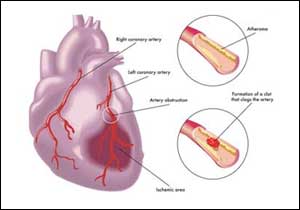- Home
- Editorial
- News
- Practice Guidelines
- Anesthesiology Guidelines
- Cancer Guidelines
- Cardiac Sciences Guidelines
- Critical Care Guidelines
- Dentistry Guidelines
- Dermatology Guidelines
- Diabetes and Endo Guidelines
- Diagnostics Guidelines
- ENT Guidelines
- Featured Practice Guidelines
- Gastroenterology Guidelines
- Geriatrics Guidelines
- Medicine Guidelines
- Nephrology Guidelines
- Neurosciences Guidelines
- Obs and Gynae Guidelines
- Ophthalmology Guidelines
- Orthopaedics Guidelines
- Paediatrics Guidelines
- Psychiatry Guidelines
- Pulmonology Guidelines
- Radiology Guidelines
- Surgery Guidelines
- Urology Guidelines
Increased troponin levels increase death risk in young adults: BMJ

UK: Increased levels of troponin may raise mortality risk (regardless of age), even if the increase is only slightly above normal, a recent study published in the BMJ journal has found. The study further found excess mortality with a raised troponin to be heavily concentrated in the first few weeks.
"In young patients, a positive troponin result is associated with very high mortality risk. Elderly patients have very high mortality when the troponin level is negative, and even higher when the level is positive," wrote the authors. "A positive troponin result is therefore highly clinically meaningful, regardless of age, with the excess mortality associated with a raised troponin level being heavily concentrated in the first few weeks."
The troponin assay is recognized by American and European guidelines as the preferred biomarker for the diagnosis of acute myocardial infarction. Evidence has shown a direct relationship between the magnitude of troponin increase and mortality but over a limited range of troponin levels. However, there is limited data on the relation between troponin level and mortality across the full age spectrum, particularly for the very elderly compared with young people.
Amit Kaura, Imperial College London and Imperial College Healthcare NHS Trust, Hammersmith Hospital, London, UK, and colleagues determined the relation between age and troponin level and its prognostic implication.
The study involved over 250,000 patients who had undergone troponin measurements at 5 UK hospitals over 8 years. Analyses on troponin were performed using the peak troponin level, which was the highest troponin level measured during the patient’s hospital stay. Troponin levels were standardized as a multiple of each laboratory’s 99th centile of the upper limit of normal (ULN). All-cause mortality was the main outcome measure.
Read Also: Increased troponin levels after exercise may predict higher mortality and adverse CVD events
Key findings of the study include:
- During a median follow-up of 1198 days (interquartile range 514-1866 days), 55 850 (21.7%) deaths occurred.
- A positive troponin result (that is, higher than the upper limit of normal) signified a 3.2 higher mortality hazard over three years.
- Mortality varied noticeably with age, with a hazard ratio of 10.6 in 18-29-year-olds and 1.5 in those older than 90.
- A positive troponin result was associated with an approximately 15 percentage points higher absolute three-year mortality across all age groups.
- The excess mortality with a positive troponin result was heavily concentrated in the first few weeks.
- A direct relation was seen between troponin level and mortality in patients without acute coronary syndrome (ACS, n=120 049), whereas an inverted U shaped relation was found in patients with ACS (n=14 468), with a paradoxical decline in mortality at peak troponin levels >70×ULN.
- In the group with ACS, the inverted U shaped relation persisted after multivariable adjustment in those who were managed invasively; however, a direct positive relation was found between troponin level and mortality in patients managed non-invasively.
Read Also: Elevated cardiac troponin no benign condition even in absence of MI
"In a population of all patients in whom troponin is assessed for clinical reasons, this biomarker can risk stratifying between high and low mortality risk for all age groups. Although even weakly raised troponin levels had marked prognostic significance, clinical decisions should depend on the underlying disease and not simply on the degree of increase in troponin," concluded the authors.
The study, "Association of troponin level and age with mortality in 250 000 patients: cohort study across five UK acute care centers," is published in the BMJ journal.

Disclaimer: This site is primarily intended for healthcare professionals. Any content/information on this website does not replace the advice of medical and/or health professionals and should not be construed as medical/diagnostic advice/endorsement or prescription. Use of this site is subject to our terms of use, privacy policy, advertisement policy. © 2020 Minerva Medical Treatment Pvt Ltd